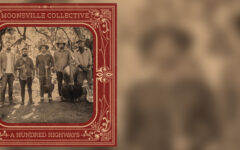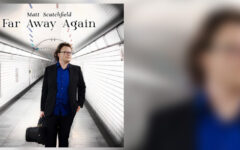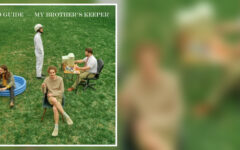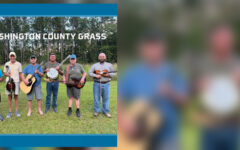
The title of Eliza Mary Doyle’s latest recording, It Ain’t What It Seems, is somewhat accurate when it comes to the music featured on the album’s twelve tracks. It’s not fair to only describe the songs as old-time, even though Doyle is an ace old-time banjo player whose vocal stylings might draw comparisons to ballad singers and country musicians of the 1920s and 30s. That’s because there’s also a heavy current of wistful folk and indie country flowing through the album, as well as a number of instruments that would never be found on most old-time recordings, even in the present day (drums, pedal steel, and electric bass, for instance). What results is an intriguing mixture of sounds that allows Doyle’s personal style to shine through strongly.
Opening track Nothin’ to Lose deftly weaves together the lonesome sounds of Doyle’s banjo and Lucas Goetz’s pedal steel, setting the mood for the musings of a woman who has decided to break free from the chains of daily life. It’s an enjoyable, upbeat song – one of the album’s best. Vancouver could possibly be considered its sequel, with its story of a “broken-hearted, down and out girl” who wasn’t as free as she had thought. Though it shares some lyrics with the previous song, it has a much darker, bleak outlook.
Say Darlin’ Say is probably the most deliberately “old-time” song on the record, with a simple, almost somber banjo and vocal arrangement and lyrics that could have been pulled from an historical songbook. The harmonies here are crystal clear, as Doyle’s lead is joined by Paula McGuigan and Liza Holder (who play bass and guitar, respectively, on most of the rest of the album). Could’ve Had It All brings in a full string band sound, including fiddles from Lydia Azure and Ryan Spracklin that layer nicely with Doyle’s banjo. It’s the first time I’ve ever heard an electric guitar in an old-time string band, however, and while it isn’t expected unless you’ve looked at the liner notes, it works in the sense of the album as a whole.
Say It falls into folk, singer-songwriter territory, with Doyle on the verge of a breakup, pleading with the one she loves: “If you don’t want me, then you better say so. If you know something that I don’t know, you better say it.” Goetz on organ is another somewhat unexpected touch, though it sets the mood here nicely. High and Lonesome finds the singer emerging from heartbreak and wondering if love might be real this time, while Old Blue Jeans is a lyrically strong, “same old story” type of song about a man who’s never going to change. Doyle breaks out her dobro here for a bit of a bluesy sound.
With an almost entirely original set of songs (Doyle wrote eleven of the twelve tracks here) and a strong showing on vocals and multiple instruments, Doyle offers fans of both old-time and folk music an enjoyable glimpse at her musical talents. Her tour seems to keep her mostly in Canada, but her new album is available from a number of online music retailers.
For more information, visit www.elizamarydoyle.com.







